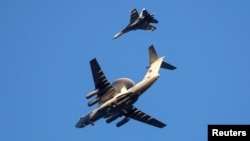On May 26, the U.S. Africa Command announced in a written statement that Russia recently deployed military fighter aircraft to Libya. This is an effort to support about 1,200 mercenaries of the Russian state-sponsored military contractor Wagner Group, who, according to media reports, have been deployed to Libya to strengthen the forces of renegade military commander Khalifa Haftar.
Haftar has led the militia known as the Libyan National Army in an offensive against the United Nations-recognized Government of National Accord headed by Prime Minister Fayez Sarraj.
"Russia is clearly trying to tip the scales in its favor in Libya," said General Stephen Townsend, commander of the U.S. Africa Command.
According to the Africa Command statement, Russia has employed Wagner mercenaries in Libya to conceal its direct role there, and to afford Moscow plausible deniability of its malign actions. U.S. Africa Command assesses that Moscow's military actions have prolonged the Libyan conflict and exacerbated casualties and human suffering on both sides.
“For too long, Russia has denied the full extent of its involvement in the ongoing Libyan conflict. Well, there is no denying it now. We watched as Russia flew fourth-generation jet fighters to Libya -- every step of the way,” said General Townsend. “Neither the [Libyan National Army] nor private military companies can arm, operate, and sustain these fighters without state support -- support they are getting from Russia."
Painting over the flags on its fighter aircraft will not hide the truth. Russia's destabilizing activities in Libya are plain to see. Neither the international community nor the Libyan people are falling for Russia's claims that its mercenaries are somehow distinct from Russia's malign, self-serving agenda in Libya.
The United States opposes the Libyan National Army’s offensive against the Government of National Accord. We support an immediate end to external interference and the involvement of foreign mercenaries in the conflict, and call for de-escalation, a ceasefire, a return to a UN-facilitated political process.
It is not the warring parties but the Libyan people who must resolve this crisis through political negotiations; negotiations that cannot proceed when external actors such as Russia fuel the conflict.














